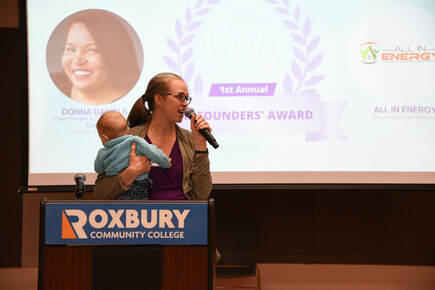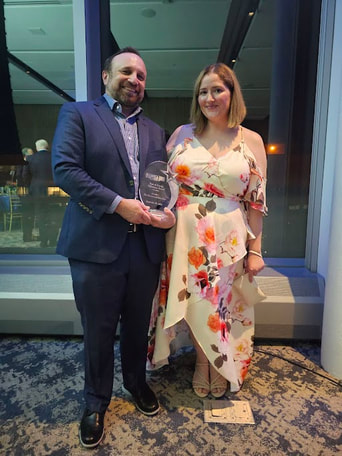|
Hello everyone, my name is Ana Lucia Lopez, and it's a pleasure to share a little bit of my journey with you. I'm originally from Colombia and have been living in the U.S. for 8 years. Back in my college days at Bunker Hill Community College, I was studying Visual Design, and eager to find an internship that would not only help me grow my skills but also contribute to my professional growth. My journey with All In Energy began in 2020, at a time when I felt like I was riding a roller coaster. We were navigating through the challenges of a global pandemic, I was far away from my family, and in a political environment that created doubts about my immigration status. So all of those things combined weighed me down, a sentiment very familiar to many immigrants. There's a constant struggle with feeling undervalued when English isn't your first language and you weren't born here.
0 Comments
As many of you know, All In Energy turned five years old this year! As this year comes to a close, I’ve been thinking about what we’ve accomplished in our first five years as an organization. I wanted to share a quick recap of the tremendous growth we’ve had since we started in spring 2018 and share some of what is so exciting about where we are today. Thinking back a little over 5 years ago, Gabe and I didn’t even know each other! We were introduced by a professor at BU and, after a 2 hour conversation over coffee, Gabe invited me to join him in launching a new nonprofit All In Energy with a mission to accelerate an inclusive clean energy economy. The vision was to bring energy efficiency and renewable energy programs to underserved communities and to leverage this work to create first-time career-launching clean energy jobs for diverse candidates. Looking back, I hardly knew this guy, but I took the biggest risk of my career and said yes. Boy am I glad I did.
With 2023 coming to an end, we want to express our gratitude to everyone who has supported and followed All In Energy and the work we do. A special shout-out goes to the incredible interns who joined us this year, embedding their passion and talent into our journey. Here are glimpses of the interns we had the privilege to collaborate with this year, offering a sneak peek into their journey with us.
AIE. ILY. As a graduate student pursuing a Master of Arts in Communication at Merrimack College while juggling being a Residence Director and a student-athlete, All In Energy granted me one of the best opportunities Covid gave us: a remote internship. While this may not have been my first internship, it was my first working in the clean energy field. When I became the Marketing and Communications Intern, it was my job to customize engaging marketing materials and social media graphics about energy efficiency and renewable for underserved communities.  But how was I supposed to do that if I barely knew how to explain those phrases? Of course, I understood the basics of clean energy. To translate it into an appealing graphic was a different story. Different, but not difficult. All In Energy provided the resources needed to complete my tasks effectively. The transition from learning to doing was smooth as I received training during the first week of my internship regarding energy efficiency and its various components and benefits, such as insulation, energy bill checkups, and more. I could go on and on about what I learned, like how to use online task management tools like Asana or experiment with color palettes and contrast to create aesthetically pleasing designs. However, what I earned is a different perspective. I had the chance to gain relationships with several members of All In Energy and understand them as both workers and people, especially the co-founders. (How many beneficial companies exist where you meet the founders?) I earned the chance to work with a company that focused on helping underserved communities save money and supplying them with career opportunities since the clean energy industry lacks diversity. As an African American woman, I loved that approach and appreciated the inclusion of the company. Most significantly, I earned growth. I grew my knowledge about nonprofit organizations, economic justice, and climate change. This growth enlightened me about new skills I adapted and maximized the skills I possess. Now that I’m finished with school and am figuring out what is next for me, I do know one thing: I aim to work in an environment as supportive and dedicated as All In Energy. - Goldera Surles, Marketing and Communications Intern
Read our co-founder Rouwenna Altemose's award ceremony remarks below:Thank you so much for this incredible award. We are just so honored to be recognized with this inaugural DEI Founders Award. All In Energy turned five this year - what a way to celebrate! When my co-founder Gabe Shapiro and I decided to start All In Energy five years ago with a mission to accelerate an inclusive clean energy economy, we aimed to tackle two interrelated problems at the same time: Despite MA having nation-leading energy efficiency and renewable energy programs, more of these resources were flowing to wealthier whiter communities with low income and BIPOC communities being left behind. At the same time, while our state had a quickly growing clean energy economy, women were underrepresented by 50% compared to the overall population and, while data is sparse, walk into nearly any clean energy company and you’ll immediately see that people of color are underrepresented in leadership roles across the industry. We decided to create an organization that would run community-based outreach campaigns to engage residents in underserved communities and help them connect to energy-saving programs that save money, make homes healthier and fight climate change. We would simultaneously create first-time clean energy job opportunities for diverse candidates, focusing on recruiting talent from communities like those we aimed to serve. When we told people about this vision, we often got the response that this was too complicated and no one would understand what we were trying to do.  However, I’m proud to say that five years later, we are still focused on this dual approach - and it’s working! To date, we have provided jobs, paid or credit earning internships to 70 individuals, of whom 57% have been women, 57% multilingual, and 67% have identified as BIPOC or Latinx. For 74%, their work with us was their first experience in the clean energy industry. It has been so inspiring to watch the career growth of these individuals. Take Natalia, or Nat, Tanko who worked with us back in Fall 2018 as a Community Outreach Intern - their first clean energy job. After helping us engage over 125 residents through field outreach, they decided to stay in the industry. Over the past 3.5 years, Nat has advanced 5 levels from Intern to Produce Manager II, at Uplight, a software company that connects energy customers to the decarbonization goals of power providers while helping those customers save energy and lower costs. Or Grace Umana, a first generation college student whose parents immigrated to the US from Honduras. She joined our team while she was a student at BHCC to knock renter’s doors in Cambridge. She was interested in environmental justice but wasn’t sure she had the skills to jump into the industry. She totally did. She advanced through several roles with us to become a Program Manager. Grace was particularly adept at building trust with residents, especially Spanish speakers, and this allowed her to engage residents in energy efficiency programs, connect them with programs to overcome utility debt, and provide critical feedback to other vendors in the industry on how to build this trust. Recently, Grace accepted a new position at the City of Chelsea where she will be engaging residents and connecting them with a wide variety of services to address inequities. While we are sad to see her go, we see her growth as a successful demonstration of the career-launching potential of our mission. We have rapidly expanded our outreach work, moving from an initial pilot campaign in Dorchester MA to now supporting over 50 communities statewide to connect underserved groups to the Mass Save programs. We are expanding our energy bill check-ups to help residents get them out of predatory 3rd party energy contracts and out of major energy bill debt. We are now leveraging this work to influence systemic changes within Mass Save, in collaboration with the community organizations, municipalities and key partners within the utilities. Our work has DEI at its core and we have done our best to build an organization with a diverse team, an inclusive culture, and equitable practices. And we know there is always more to be done to deepen our own understanding of equity issues, integrate the perspectives of our diverse team and formalize our commitment through our organizational practices. As we continue to grow, we are doubling down on this commitment, with plans to hire a DEI consultant this next year to help us strengthen and formalize our efforts internally and externally. (I know this isn’t a fundraising speech, but if you all know folks who fund this kind of work, I’m all ears!)
We are grateful to NEWIEE for your commitment to equity and the support your hey have provided to our team members, especially some of our early-career staff who have benefited from being exposed to such a diversity of professionals and career types and to mentorship opportunities. Thank you again for this incredible honor to be recognized with this award. We look forward to continued partnership as we all work to advance equity across the industry.
We are honored to be recognized alongside the Mass Save Sponsors and the 52 communities participating in this initiative for our collaborative work to advance equity in the Mass Save programs. Read the press release below. Sponsors of Mass Save® Wins Prestigious Stars of Energy Efficiency Award Honor recognizes industry leaders with outstanding commitment to advancing energy efficiency Boston, MA (September 20, 2023) – The Sponsors of Mass Save ® are proud to announce they have been awarded the prestigious Stars of Energy Efficiency Consumers Award by the Alliance to Save Energy in recognition of its Community First Partnership (CFP). CFP is an equity-focused outreach program developed by the Mass Save Sponsors: Berkshire Gas, Cape Light Compact, Eversource, Liberty Utilities, National Grid, and Unitil. The program seeks to increase energy efficiency participation among traditional energy efficiency non-participants, a group that includes:
 The Mass Save Sponsors, working with lead vendor All In Energy, provide recipients with up to $60,000 in funding as part of efforts to deliver equitable access to a clean energy future for all customers. The financial support is awarded to expand outreach and increase energy efficiency participation in Environmental Justice Communities where, historically, energy burdens are disproportionately high. Funding recipients receive comprehensive training in energy efficiency offerings, including residential and small business weatherization, heating and cooling upgrades, and multilingual marketing materials. The Sponsors’ ongoing support enables robust outreach to renters and landlords, non-English speaking/limited English proficiency residents, low-to-moderate income households, and small businesses. To learn more about the Sponsors’ Community First Partnership, please visit: https://www.masssave.com/trade-partners/community-partnership  “The Sponsors of Mass Save greatly appreciate the Alliance to Save Energy’s recognition of the Mass Save Community First Partnership program. This program is just one of the many ways in which the Sponsors are working with local communities to amplify the voices of trusted partners, extend the reach of our programs, and ensure that the benefits of energy efficiency and decarbonization are reaching all of our customers,” said Christopher Porter, Director of Customer Energy Management at National Grid. “We hope that this innovative approach can become a model for accelerating a just and equitable energy transition not only in Massachusetts, but also that our learnings can be leveraged in developing and scaling programs around the country. We are grateful to ASE for their support in highlighting our efforts here.” The Alliance to Save Energy is a bipartisan, nonprofit coalition of business, government, environmental, and consumer leaders advocating to advance federal energy efficiency policy. Since 1993, the Alliance to Save Energy has hosted the Stars of Energy Efficiency Awards to honor organizations and individuals that have demonstrated an outstanding commitment to advancing energy efficiency. “We looked for organizations that demonstrated innovation, creativity, leadership, replicability, and degree of difficulty in overcoming challenges when choosing this year’s winners,” said Alliance President Paula Glover. “Our awardees are exemplars of leading with Energy Efficiency First and the Alliance’s key priorities of energy equity, reliability, affordability, and emission reductions.” Mass Save is joined by fellow award winners Thomas Kuhn, CEO, Edison Electric Institute and the Honorable Willie Philips, Acting Chair, FERC receiving the Chairman’s award; Phil Croskey, CEO of MD Energy Advisors will receive the Rising Star award; Southern California Edison, receiving the Transportation award; Philadelphia Energy Authority, being honored with the Transportation Infrastructure and Residential Built Environment awards; Prologis Inc., receiving Commercial Built Environment award; Entergy Arkansas, being honored with the Utilities Star of Energy Efficiency award; Consumers Energy, accepting the Utilities Energy Efficiency award; and Willow, Inc. and Dallas Fort Worth International Airport receiving the Innovation award.
Awardees were honored at the 31st Annual Evening with the Stars of Energy Efficiency Awards Gala on Tuesday, September 19 at the International Spy Museum in Washington, D.C. About Mass Save: Mass Save® is a collaborative of Massachusetts’ electric and natural gas utilities and energy efficiency service providers including Berkshire Gas, Cape Light Compact, Eversource, Liberty, National Grid, and Unitil. We empower residents, businesses, and communities to make energy efficient upgrades by offering a wide range of services, rebates, incentives, trainings, and information. We respectfully ask that Mass Save is referred to as “the Sponsors of Mass Save,” or “the Mass Save Sponsors,” to reflect the participation of all utility and energy efficiency service providers within the collaborative. For more information, please visit https://www.masssave.com/ It's not often that I have the opportunity to hear from such diverse individuals as Tommy Caldwell, a professional climber, Bill Nye, and Kamala Harris. That's what was so great about getting to attend the Aspen Institute’s Climate Conference. I was selected by Aspen Institute as a future leader, an honor I shared with 250 fellow 18-30 year olds working on climate change. The diversity of thinkers there was impressive. From someone who worked at Heineken thinking about the sustainability of brewing beer to TikTok and LinkedIn influencers to people working for powerful corporations, I was able to broaden my perspective on the different ways people think about and work on the issue of climate change. My job can look totally different from someone else’s and still be united by the common thread of addressing climate change. I was reminded of this fact with every person I met at the conference. The breadth of professions represented at the conference didn’t reduce my feeling of unity; I knew we were all working to address climate change and its impacts. I didn't agree with all of the perspectives represented at the conference, and this was my first time outside my liberal bubble in Boston hearing from people that had very different opinions on what priorities are for climate change.he diversity of thinkers there was impressive. From someone who worked at Heineken thinking about the sustainability of brewing beer to TikTok and LinkedIn influencers to people working for powerful corporations, I was able to broaden my perspective on the different ways people think about and work on the issue of climate change. For instance, speakers such as Richard Powell (CEO of ClearPath) at a plenary session (plenaries convene larger groups of people at a conference) underscored the importance of capitalism to solve the problems of climate change, without mentioning the equity problems that are built into the structures of capitalism. While I disagreed with some peoples' points, I valued the opportunity to speak with people who had opinions that differed from my own. It forced me to consider their perspectives. Learning to deal with conflict and disagreements is an important skill to develop to try and reach as many people as possible, as we all must be in it together to address climate change. While I disagreed about some of the approaches people at the conference had in their work, being exposed to them reaffirmed how important it is to me to include equity considerations in all climate policy implementation. Many presentations and discussions lacked that lens, and it is lapse I hope to continue having the space to point out and bring up. I had the chance to speak with multiple government officials including Mayor Jon Mitchell of New Bedford and Esther Sosa, Special Advisor for Policy, IRA Implementation, at the Environmental Protection Agency (EPA). about how they are trying to implement legislation including the MA Environmental Justice Policy and the Justice40 Initiative that requires more projects at the federal and state level to include justice considerations to be eligible for funding. I was grateful for the chance to speak to these changemakers, as well as others like Charles Hua from Rewiring America and McKenna Dunbar from Building Electrification at the Sierra Club about the work I do at All In Energy to amplify the impact of the outreach we do every day to people who have historically been left behind. With the support of All In Energy’s Professional Development funds, I was able to spend a week learning from others about topics relevant to our work and broader mission, and also teach others about the implementation barriers we see and work with every day. Many people at the conference seemed more experienced than me with more impressive titles. By the end of the week, I gained so much confidence by going outside my comfort zone to talk to these people. I quickly learned that no matter their title or years of work experience, in their own way, everyone had the united goal of learning and growing, all to figure out how to better address climate change. At the beginning of this year, I was able to join a professional organization, New England Women in Energy and the Environment (NEWIEE) with the support of All In Energy. In the year that has passed since graduating with my Master’s. I have joined a professional organization, attended networking events alongside my coworkers, and been selected to attend a conference as a future climate leader. My coworkers and peers have pushed me to achieve, and supported me along the way. Because of them, I have achieved much more in a year than I could dream of when I was beginning college. I can’t wait to continue supporting the All In Energy team, and seeing all we can accomplish together in the future. I’m sure it will be more than we could ever imagine.
|
AuthorWrite something about yourself. No need to be fancy, just an overview. Archives
June 2025
Categories |
About usAll In Energy is a 501(c)3 nonprofit with a mission to advance an inclusive clean energy economy. We bring energy efficiency and renewable energy to underserved communities, while increasing job opportunities for diverse talent in the clean energy industry.
|
Have questions? |
